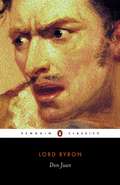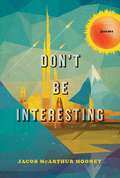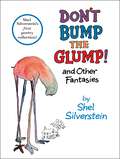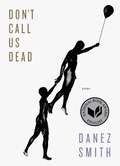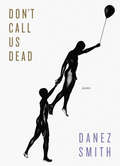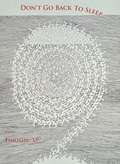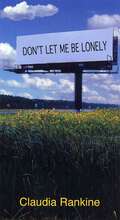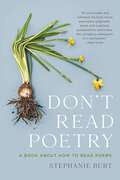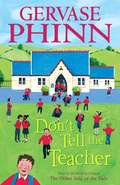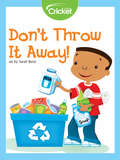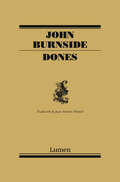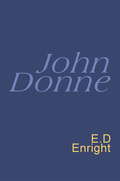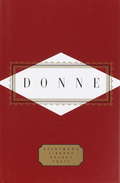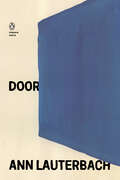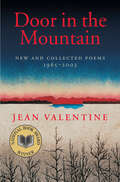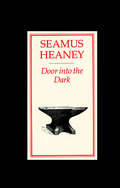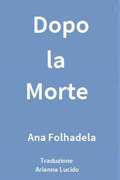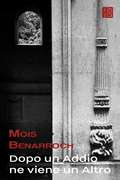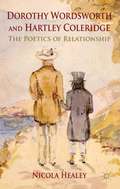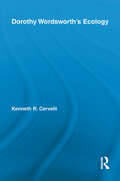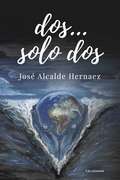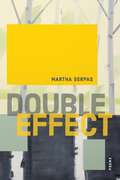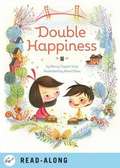- Table View
- List View
Don Juan
by Lord ByronByron's exuberant masterpiece tells of the adventures of Don Juan, beginning with his illicit love affair at the age of sixteen in his native Spain and his subsequent exile to Italy. Following a dramatic shipwreck, his exploits take him to Greece, where he is sold as a slave, and to Russia, where he becomes a favourite of the Empress Catherine who sends him on to England. Written entirely in ottava rima stanza form, Byron's Don Juan blends high drama with earthy humour, outrageous satire of his contemporaries (in particular Wordsworth and Southey) and sharp mockery of Western societies, with England coming under particular attack.
Don't Be Interesting: Poems
by Jacob Mcarthur MooneyDon't Be Interesting is a collection that grapples with 'The Future' as public morality-keeper and private reckoner. The book explores the lines dividing the present from both the future and the past. Its channels include all the breadth of mass experience, from film and sport to science fiction novels, war, history, technology, and biography. Part travelogue, the book dredges up mid-century optimisms in Europe and America.
Don't Bump the Glump!
by Shel SilversteinIt's a zoo in here!Have you ever . . .Seen a Gritchen in your kitchen?Dared to dance with the One-Legged Zantz?Declined to dine with the Glub-Toothed Sline? You haven't? Well then, step inside—but only if you are ready to be amazed, tickled, astonished, and entertained by this most unusual bestiary of silly and scary creatures.Shel Silverstein combined his unique imagination and bold brand of humor for his first poetry collection—the only one he illustrated in full color. Now celebrating fifty years, Don't Bump the Glump! and Other Fantasies was originally published in 1964, the same year as his most famous picture book, The Giving Tree.
Don't Call Us Dead: Poems
by Danez Smith<P>Award-winning poet Danez Smith is a groundbreaking force, celebrated for deft lyrics, urgent subjects, and performative power.<P> Don’t Call Us Dead opens with a heartrending sequence that imagines an afterlife for black men shot by police, a place where suspicion, violence, and grief are forgotten and replaced with the safety, love, and longevity they deserved here on earth.<P> Smith turns then to desire, mortality—the dangers experienced in skin and body and blood—and a diagnosis of HIV positive.
Don't Call Us Dead: Poems
by Danez SmithFinalist for the National Book Award for PoetryWinner of the Forward Prize for Best Collection“[Smith's] poems are enriched to the point of volatility, but they pay out, often, in sudden joy.”—The New Yorker Award-winning poet Danez Smith is a groundbreaking force, celebrated for deft lyrics, urgent subjects, and performative power. Don’t Call Us Dead opens with a heartrending sequence that imagines an afterlife for black men shot by police, a place where suspicion, violence, and grief are forgotten and replaced with the safety, love, and longevity they deserved here on earth. Smith turns then to desire, mortality—the dangers experienced in skin and body and blood—and a diagnosis of HIV positive. “Some of us are killed / in pieces,” Smith writes, “some of us all at once.” Don’t Call Us Dead is an astonishing and ambitious collection, one that confronts, praises, and rebukes America—“Dear White America”—where every day is too often a funeral and not often enough a miracle.
Don't Go Back To Sleep
by Timothy LiuDon't Go Back To Sleep answers the Sufi call to wake up to this life in the here and now where ecstasy serves its summons, inviting us to break out of the mundane quotidian. Timothy Liu winds the clock back to the Nanking Massacre in 1937, then traces its consequences on his family of origin, his mother's mental illness, his father's religious fundamentalism, and Liu's obsessive search for love. As trauma begets trauma the poems slowly accrete, and Liu takes on a legacy of poetic witness where carnal violence ultimately turns to spiritual joy.
Don't Let Me Be Lonely: An American Lyric
by Claudia RankineA brilliant and unsparing examination of America in the early twenty-first century, Claudia Rankine’s Don’t Let Me Be Lonely invents a new genre to confront the particular loneliness and rapacious assault on selfhood that our media have inflicted upon our lives. Fusing the lyric, the essay, and the visual, Rankine negotiates the enduring anxieties of medicated depression, race riots, divisive elections, terrorist attacks, and ongoing wars—doom scrolling through the daily news feeds that keep us glued to our screens and that have come to define our age.First published in 2004, Don’t Let Me Be Lonely is a hauntingly prescient work, one that has secured a permanent place in American literature. This new edition is presented in full color with updated visuals and text, including a new preface by the author, and matches the composition of Rankine’s best-selling and award-winning Citizen and Just Us as the first book in her acclaimed American trilogy.Don’t Let Me Be Lonely is a crucial guide to surviving a fractured and fracturing American consciousness—a book of rare and vital honesty, complexity, and presence.
Don't Read Poetry: A Book About How to Read Poems
by Stephanie BurtAn award-winning poet offers a brilliant introduction to the joys--and challenges--of the genreIn Don't Read Poetry, award-winning poet and literary critic Stephanie Burt offers an accessible introduction to the seemingly daunting task of reading, understanding, and appreciating poetry. Burt dispels preconceptions about poetry and explains how poems speak to one another--and how they can speak to our lives. She shows readers how to find more poems once they have some poems they like, and how to connect the poetry of the past to the poetry of the present. Burt moves seamlessly from Shakespeare and other classics to the contemporary poetry circulated on Tumblr and Twitter. She challenges the assumptions that many of us make about "poetry," whether we think we like it or think we don't, in order to help us cherish--and distinguish among--individual poems.A masterful guide to a sometimes confounding genre, Don't Read Poetry will instruct and delight ingénues and cognoscenti alike.
Don't Tell the Teacher
by Gervase PhinnBrilliantly observed as always, family, teachers, pupils and the dreaded school inspector all leap to life in this wonderfully warm and witty, brand new, poetry collection from bestseller Gervase Phinn. New kids, disobedient deputy heads, school reports and fireworks, daydreamers and embarrassing mums all make an appearance. And if read on you might even just discover the whereabouts of Colin's confiscated conkers...just don't tell the teacher!
Don't Throw It Away!
by Amy TaoReduce, recycle, and reuse. We can all help Earth, if we choose. In this poem, kids learn about the differences between recycling, compost, and hazardous waste.
Dones
by John BurnsideUno de los más recientes poemarios de John Burnside, uno de los grandes poetas británicos, y una de las contribuciones más brillantes a la poesía de nuestro tiempo. John Burnside es uno de los escritores británicos más originales y relevantes de nuestros días. Dones es uno de sus más recientes poemarios y una de las contribuciones más brillantes a la poesía de nuestro tiempo. Diáfanos e intensamente trascendentales, estos poemas logran crear una inmediata intimidad con el lector, invitado a sumergirse en el agua de unos versos cuyo canto perdura en la memoria, como una experiencia íntima.
Donne: Everyman's Poetry
by John DonneThe best of John Donne's poemsJohn Donne (1572-1631) was born into a Catholic family and studied law before sailing with Essex to attack Cadiz in 1596. He was appointed secretary to Sir Thomas Egerton, the Lord Keeper (later Lord Chancellor), in 1598, but forfeited his worldly prospects when he secretly married Ann More, Lady Egerton's niece, in 1601; he was dismissed by Egerton and briefly imprisoned. The next twelve years or so were passed in poverty, without regular employment. He entered the Church and in 1621 was made Dean of St Paul's, where he became a renowned preacher. His first collection of poems was published posthumously in 1633.
Donne: Poems (Everyman's Library Pocket Poets Series)
by John DonneThe Everyman's Library Pocket Poets hardcover series is popular for its compact size and reasonable price which does not compromise content. Poems: Donne contains Songs and Sonnets, Letters to the Countess of Bedford, The First Anniversary, Holy Sonnets, Divine Poems, excerpts from Paradoxes and Problems, Ignatius His Conclave, The Sermons, Essays and Devotions, and an index of first lines.
Don’t Read This Book, Whatever You Do!
by Kalli DakosBy turns wistful and funny, the poems in this collection capture the ups and downs of school life with uncanny accuracy. In the tradition of If You're Not Here, Please Raise Your Hand, these poems, complemented by lively drawings, speak to children's hearts, to their fears, and to the special joys found in every corner of a classroom. Ages 7-11.
Door (Penguin Poets)
by Ann LauterbachNamed a Most Anticipated Book of 2023 by LitHub A new collection of vivid, personal and provocative work from the author of Or to Begin Again, a finalist for the 2009 National Book Award in poetryIn Ann Lauterbach&’s eleventh collection, the image of a Door recurs across several poems, as she considers the perpetual dialogue between what is open and what is shut for each of us. The Door is a threshold between the inner landscape of memory, thought, imagination and dream and the outer so-called real world, which increasingly comes to us through technology&’s lens, displacing and distorting our sense of intimacy, presence and relation. What is near, and what is far away? She asks about the efficacy of language itself, when confronted by the urgent uncertainties of contemporary experience.
Door in the Mountain: New and Collected Poems, 1965-2003 (Wesleyan Poetry Series)
by Jean ValentineThis National Book Award–winning volume presents nearly forty years of the renowned poet&’s work. Between 1965 and 2003, Jean Valentine published nine critically acclaimed collections of poetry, including Dream Barker(winner of the Yale Younger Poets Award), Ordinary Things, and The River at Wolf. Spare and intensely-felt, Valentine&’s poems present experience as only imperfectly graspable. This volume gathers together all of Valentine's published poems, presenting them alongside a stunning new collection. Valentine&’s poetry is as recognizable as the slant truth of a dream. She is a brave, unshirking poet who speaks with fire on the great subjects―love, and death, and the soul. Her images―strange, canny visions of the unknown self―clang with the authenticity of real experience. This is an urgent art that wants to heal what it touches, a poetry that wants to tell, intimately, the whole life.
Door into the Dark
by Seamus HeaneyDoor into the Dark, Seamus Heaney's second collection of poems, first appeared in 1969. Already his widely celebrated gifts of precision, thoughtfulness, and musicality were everywhere apparent.
Dopo la Morte
by Ana FolhadelaRaccolta di poesie e componimenti sul tema della morte. Un viaggio profondo, guidato dalla sensibilità dell'autrice che porta il lettore a riflettere su un argomento che lega tutta l'Umanità. Pubblicato nel 2019.
Dopo un addio ne viene un altro
by Mois Benarroch Francesca RuscelloAmore urgente, amore latente, amore quotidiano, amore assente, amore di sempre, amore immaginato, amore vissuto, amore sposato, amore orfano, amore amante, amore amato, amore perduto, mancanza d'amore, amanti di minuti e amanti di anni, amore etico, amore estetico, donna vissuta e donna sognata, donna prima dell'esilio, donna dell'esilio, donna della gioventù, donna dell'infanzia. Queste poesie di Mois Benarroch trattano tutte le posizioni dell'amore nei giorni nostri, nel nostro mondo che è quello di sempre e così attuale. Mois Benarroch (Tetouan, Marocco,1959) è un poeta e romanziere. La sua poesia ha viaggiato mezzo mondo, raggiungendo dodici lingue. Ha ricevuto il prestigioso premio Yehuda Amijai per la poesia, poesia che scrive in tre lingue. Ha pubblicato libri in Israele, Spagna e Stati Uniti. in prestigiosi editori come Destino, Escalera, Hakibutz Hameujad e altri. Tra i suoi romanzi è possibile menzionare "Nelle porte di Tangeri", "Il ladro dei ricordi", "L'espulso" e "Sciarpa blues". Su Kindle si trovano i libri di poesie "Mare di Sefarad" e "Tuist il tuit", un libro di poesie che cambiano. Benarroch ha ricevuto il premio di primo ministro (2008) e il premio Yehuda Amichay per la poesia (2012)
Dorothy Wordsworth and Hartley Coleridge
by Nicola HealeyThis book provides a reassessment of the writings of Hartley Coleridge and Dorothy Wordsworth and presents them in a new poetics of relationship, re-evaluating their relationships with William Wordsworth and Samuel Taylor Coleridge to restore a more accurate understanding of Hartley and Dorothy as independent and original writers.
Dorothy Wordsworth's Ecology (Studies in Major Literary Authors)
by Kenneth CervelliDorothy Wordsworth has a unique place in literary studies. Notoriously self-effacing, she assiduously eschewed publication, yet in her lifetime, her journals inspired William to write some of his best-known poems. Memorably depicting daily life in a particular environment (most famously, Grasmere), these journals have proven especially useful for readers wanting a more intimate glimpse of arguably the most important poet of the Romantic period. With the rise of women’s studies in the 1980s, however, came a shift in critical perspective. Scholars such as Margaret Homans and Susan Levin revaluated Dorothy’s work on its own terms, as well as in relation to other female writers of the eighteenth and nineteenth centuries. Part of a larger shift in the academy, feminist-oriented analyses of Dorothy’s writings take their place alongside other critical approaches emerging in the 1980s and into the next decade. One such approach, ecocriticism, closely parallels Dorothy’s changing critical fortunes in the mid-to-late 1980s. Curiously, however, the major ecocritical investigations of the Romantic period all but ignore Dorothy’s work while at the same time emphasizing the relationship between ecocriticism and feminism. The present study situates Dorothy in an ongoing ecocritical dialogue through an analysis of her prose and poetry in relation to the environments that inspired it.
Dos... Solo dos
by José Alcalde HernáezPoemas y quizás más de dos razones para ser feliz. Dos... Solo dos, es un poemario escrito en lenguaje sencillo. <P><P>Combina relatos y poemas, requiere de una lectura pausada y sosegada para apreciar mejor y así situar al autor. Esta obra está cargada de sentimientos muy sensibles, razona otros tantos, relata momentos de una vida y va siempre de la mano de la imaginación, mezclando fantasía y realidad. <P><P> Además, refleja al ser humano que, con valentía, reconoce sus errores y tiene la humildad para pedir perdón. Como refleja su portada, este poemario aboga por un mundo nuevo, un mundo mejor.
Dost Tujhe Salam: दोस्त तुझे सलाम
by Dr Sushma Deshmukhइस पुस्तक में लिखी कथायें चिकित्सकों के अनुभवों के अथाह सागर से मंथन करके निकले हुए अनमोल माणिक, हीरे, मोती और हमारी रोज़मर्रा की भागदौड़ भरी ज़िन्दगी में मिलने वाले संस्कारों का पाठ हैं। उम्र, शिक्षा तथा अनुभवों का यहाँ प्रश्न ही नहीं उठता। ये कथाएँ करुणा, ममता, हिम्मत, सेवा, सामाजिक कर्त्तव्य जैसे अलग-अलग गुणों का अद्भुत संगम हैं। इन कथाओं में हर बात निराली हैं। ज़िन्दगी में आने वाले तूफ़ान (बीमारी) को हिम्मत से मात देने वाली प्रेरणादायक बातें विलक्षण ही होती हैं। अपने कुटुंब, मित्र, समाज तथा दुनिया के कल्याण के लिए प्राण न्योछावर करने वाले व्यक्ति ही सच्चे आदर्श (हीरो, हीरोइन) हैं।
Double Effect: Poems
by Martha SerpasMartha Serpas’s Double Effect reimagines a principle first outlined by St. Thomas Aquinas in Summa Theologica, which considers whether an action is morally permissible if it causes harm while bringing about a good result. In resonant verse pointed by Cajun language, these poems measure the good that can come from destructive situations: maternal deprivation, spiritual poverty, mania, ecological devastation. Serpas shows that compromised marshes and the Gulf of Mexico offer surprising sustenance and clarity. Time is marked by feast days, hurricanes, celebrations, accidents, and rescues along southern Louisiana’s eroding coasts. Double Effect ultimately finds joy in survival, in love, and in spiritual fulfillment.
Double Happiness
by Nancy Tupper Ling Alina ChauFor their move far away, Gracie and Jake are sad to leavethe golden bridge,the trolley tracks,and Nai Nai.But they fill empty boxes with treasures--a marble, a snake,a pair of wings.Tiny reminders of all they love--so happiness stays close,no matter where they go.With grace and warmth, this lyrical picture book speaks to the difficulty of transition, and celebrates the ways in which love and family give us the strength to weather life's changes.
